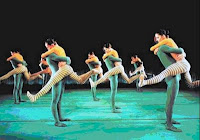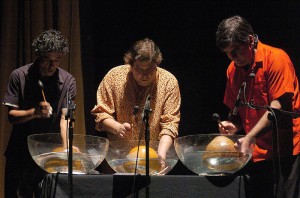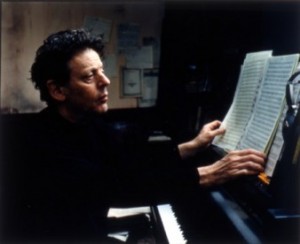Since we’ve been talking about the Amazon River lately — here and here — I thought we might listen to some Amazon River music. The story of this particular piece brings together three significant artists — the dance company Grupo Corpo, the instrumental group Uakti, and composer Philip Glass.
 |
| Grupo Corpo |
Grupo Corpo — the Body Group — is a Brazilian dance theater company founded in 1975 by Paulo Pederneiras. The company has now taken its Afro-Brazilian fusion of ballet, jazz, and modern dance all over the world, to the delight of both audiences and critics. Their performances have, as one critic put it, “sexy physicality and dramatic visual flair.” The Globe and Mail says they are “arguably the best on the planet.”
Uakti — pronounced wahk-chee — is a Brazilian instrumental group that consists of Marco Antônio Guimarães, Artur Andrés Ribeiro, Paulo Sérgio dos Santos, and Décio de Souza Ramos. The musicians all have classical backgrounds, and play with the Minas Gerais Symphonic Orchestra. Their group Uakti, however, is known for using custom-made instruments, built by the group itself using everyday materials — pipe, glasses, wood, metal, rocks, rubber, even water. For Uakti, anything can produce sound, including conventional instruments, such as guitars and cellos, but played, for example, using drumsticks.
 |
| Uakti |
Founded in 1978 under the leadership of Marco Antônio Guimarães, the group was first noticed and sponsored by prominent Brazilian singer, songwriter, and guitarist Milton Nascimento, who used the group on several of his albums and also produced their first record. Their name is taken from a Tukano legend about the musician Uakti, who had holes in his body, through which the wind would produce music that seduced women. The men grew jealous, and killed and buried him; and from his grave there grew the palm trees from which flutes are made.
Philip Glass, along with his contemporaries Terry Riley and Steve Reich, is a pioneer of minimalist music — what Glass prefers to call “music with repetitive structures.” An extraordinarily prolific composer, he has written more than twenty operas; eight symphonies; concertos for piano, violin, timpani, and saxophone quartet; five string quartets and more than thirty additional compositions for chamber orchestra; and soundtracks for more than thirty movies, ranging from Tod Browning’s Dracula to Paul Schrader’s Mishima to Godfrey Reggio’s Koyaanisqatsi. He has collaborated with Brian Eno, Ravi Shankar, Leaonard Cohen, David Bowie, Patti Smith, Paul Simon, and many others; yet his sound has always remained distinctively his own, and instantly recognizable. It is fair to say that Glass has had an extraordinary — indeed, an unprecedented — impact on contemporary music.
 |
| Philip Glass |
Almost forty years ago, I wore a groove into my vinyl recording of his hypnotic Music with Changing Parts. I have seen his operas Einstein on the Beach, Satyagraha, and Galileo Galilei. I was privileged to see him perform sections from his then uncompleted opera Hydrogen Jukebox, based on the poems of Alan Ginsberg, along with Ginsberg himself, in his finest incantatory mode, accompanying himself on the harmonium, performing his poems on the stage.
In 1993, Uakti came to Glass with a proposal that they collaborate on a dance score for Grupo Corpo, for whom Marco Antônio Guimarães had already written several original compositions. “Years ago when I first met Uakti,” Glass writes, “I saw their music and performance as a unique and beautiful contribution to the world of new and experimental music. I became friends with the musicians; especially I came to admire Marco’s extraordinary ear for color and composition. I was therefore very pleased when some years later they proposed a collaboration.” The arrangement was done by Guimarães, who adapted the work to Uakti’s instruments; this was the first time that Glass’s music was arranged by another composer. The result, Glass says, “represents a true melding of my music with their sensibilities.”
The product of this collaboration was a work entitled Águas da Amazônia—Sete ou oito peças para um balé, The Waters of Amazonia—Seven or Eight Pieces for a Ballet. Each piece is a musical representation of one of the great rivers of the Amazon. By the time the recording of the music was released in 1999, the number of rivers had grown to nine — the Tiquiê, Japurá, Purus, Negro, Madeira, Tapajós, Paru, Xingu, and Amazon. The piece Amazon River, which we offer below, uses keyboards, big pipe, borel, chori, glass marimba, marimba d’angelim, grand pan, inclined pan, condensator drums, xylophone, flute with prepared mouthpiece, and snare drum. The homemade instruments give these pieces a softer and less crystalline edge than many other works by Glass, and capture both the slow broad flow of the river and its surprisingly swift and dangerous currents.
[audio:Glass_Amazon_River.mp3|titles=Amazon River|artists=Philip Glass]
- Previous Post: Curing
- Next Post: Psychointegration
- More Articles Related to: Books and Art, The Amazon



hei steve!
i love phillip glass…
i can’t believe you attended a hydrogen jukebox show… i wish i had been there too!
one question: how did you post a music file in your blog?
abrazo figura!
The show was wonderful. Glass played selections from the opera on the piano, and then the inimitable shaman-bard-singer-poet Ginsberg chanted his poetry. I wish you could have been there too. :-)
You can embed streaming audio in a page using the HTML embed tag. A good overview is here.
awesome! thanks a lot…